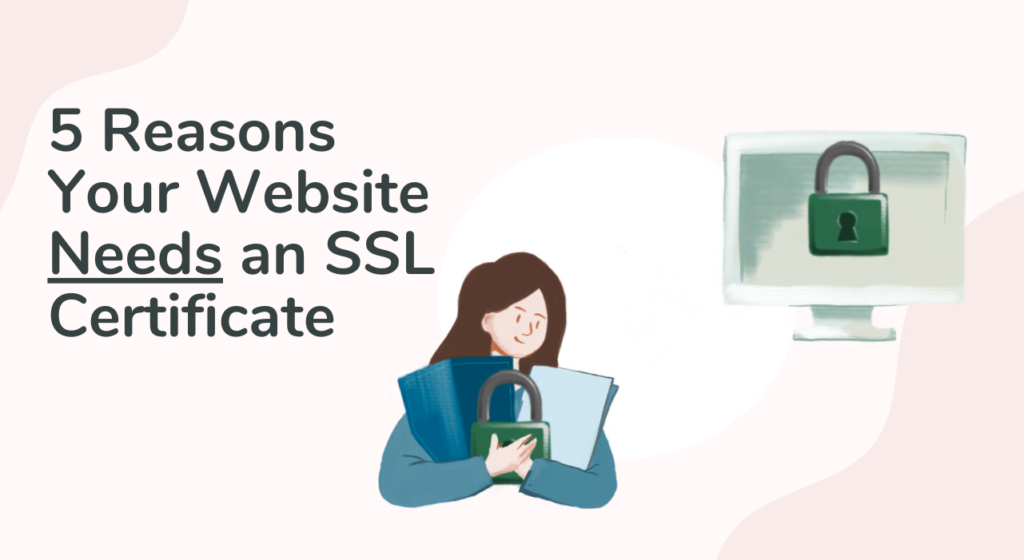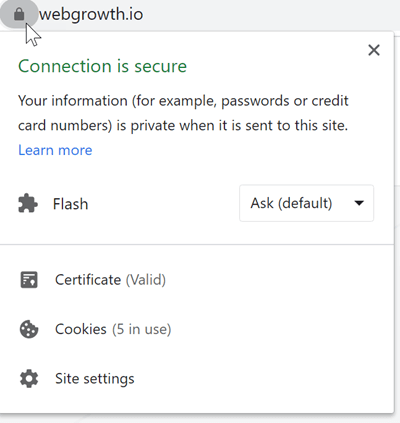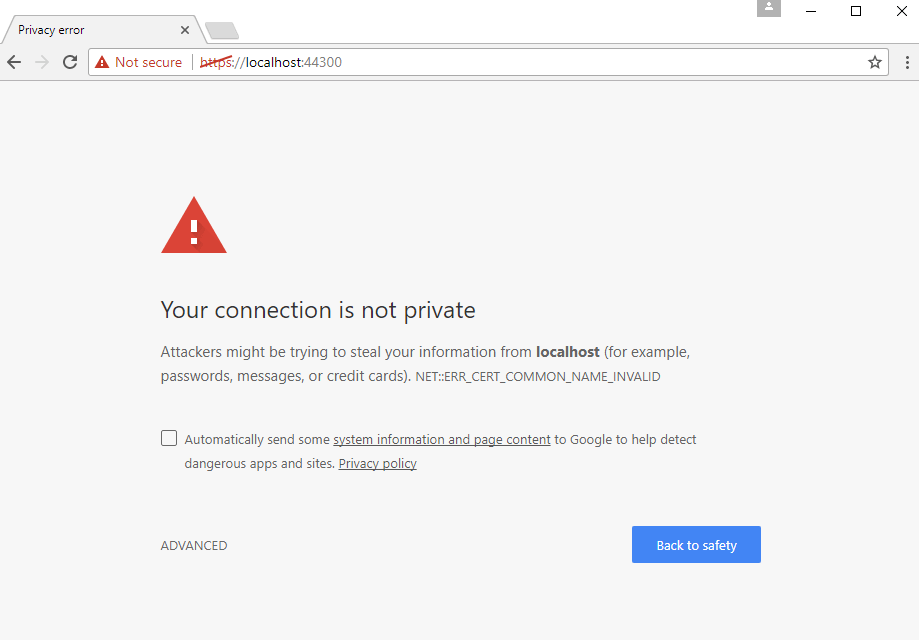5 Reasons Your Website Needs an SSL Certificate

Do you want to protect your customers’ sensitive information?
Do you want to establish trust with your website visitors?
Do you want your website to rank higher on Google?
If you answered “Yes” to any of these questions, then you need an SSL certificate on your website now!
What exactly is an SSL certificate?
Internet security is a branch of computer security that focuses on specific threats that may breach our privacy and steal our personal information.An SSL certificate is considered the backbone of internet security, as it protects sensitive information submitted to your website.You’ll recognize an SSL certificate as a small padlock symbol in your URL bar.Here’s an example:

If you click on this padlock, a window will appear and explain the details the website’s secure (or unsecure) connection:

This small data file digitally binds a cryptographic key to an organization’s details and allows you to provide a secure connection.
SSL certificates are now a common factor for most online businesses (especially those accepting payments), and it’s no longer a “bonus” feature for a website – it’s really a must-have at this point.
Why are SSL certificates so important?
Well, first off, they protect sensitive information such as:
-
- Usernames
- Passwords
- Data transfers
- Credit card information
- And basically any other personal information found online
Here are the top five reasons that you need an SSL certificate for your website.
Reason #1: It keeps your data secure between servers
Any information transmitted to or from your website will be protected by the SSL certificate due to the encrypted connection.
Simply put, it helps prevent your visitors’ sensitive data from being misused by attackers.
While they’re entirely necessary for any professional website, businesses will sometimes put off configuring SSL certificates either because of the price associated with the installation or because they simply don’t know any better.
Here’s the thing, though:
SSL certificates are affordable and really easy to set up. You can purchase the certificate through most hosting providers and then hand the task off to your developer. It should take them an hour at most to set up for most websites.
As far as your cost goes, it will vary depending on where you get it from.
GoDaddy, for example, offers them for $79.99 per year.
Our personal favorite WordPress hosting provider, Flywheel will even include them in their hosting packages for free!
So, there’s really no excuse for not having a secure website in this day and age!
In fact, in 2018, Google started labeling websites that didn’t adopt HTTPS protocol (an extension of HTTP which is used for secure websites) as “not secure,” which means your website will breach customer trust immediately.
You’ll notice that some websites use https:// while others use http:// in their URLs. The former is the more secure option and should be used whenever possible.
While HTTP was fine in the early days of the Internet, there are some types of information that require secure transit.
For example, medical practices that need to adhere to HIPAA compliance are a prime example of companies that need SSL certificates.
When a website has an SSL certificate, the transmissions (usernames, passwords, personal information) from your patients’ computers are encrypted. This means they can’t be hacked or stolen by third parties.
In this case, installing an SSL certificate is one easy step toward HIPAA compliance.
As privacy and online safety has become a priority for internet users, it’s worth investing in security features that maintain their privacy. They’ll only want to work with companies that keep their information safe.
Reason #2: It verifies your identity

These days, just about everyone knows that they can’t believe everyone or everything on the internet. If the first function of an SSL certificate is to protect your customer’s data, then the second is to verify your identity.
After all, the internet needs a way of making sure that you are who you say you are.
In the same way that Twitter and Instagram have “verification checkmarks,” imagine your SSL certificate padlock as a way to show your customers that you are, in fact, real.
When you go through the certification process, the Certificate Authority (CA) will affirm you and your identity. This will help boost your reputation by proving your identity to this independent third party – in this case, Google or, more importantly, your customer!
Now your customers won’t have to worry that you’re scamming them or stealing their data.
Reason #3: It improves your SEO
Before Google started calling out websites that didn’t have HTTPS protocol, they gave brownie points to those that did.
Nowadays, if you’re looking to compete with SEO on Google, then you need an SSL certificate.
If you make your connection safe and secure, you can make Google’s first page, but without that trust signal, it’ll be close to impossible.
Plus, think about it this way, would you really want to visit a website that says, “Warning: Unsecured Connection“?
When it comes to SEO, Google always has the user’s best interest in mind. As a search engine, it’s their job to provide searchers with the best user experience possible, and that includes providing them with safe and secure results for their search queries.
Reason #4: It makes your ad campaigns more effective
If you’re looking to run an ad campaign, then you want to make sure that it’s running optimally.
Companies that don’t have SSL certificates have started running into issues, particularly with Google’s ad network, Google Ads. This occurs when your ads become disapproved because something is wrong with your landing page.
When Google Ads accounts do not have SSL certificates, they get flagged with a warning page telling your customer that the connection isn’t private.
The warning may also come with more alarming language suggesting it isn’t safe for them to even visit your website.
For example, an attacker may be trying to steal their data or that there may be another security issue with the site.
All in all, the message is discouraging and won’t promote your potential customer to continue to your website.
Imagine you put tons of time and energy into developing a beautiful landing page that’s built to generate leads for your business.
Then you spend hundreds, if not thousands of dollars on Google ads only for your website visitors to arrive to…
Drumroll, please…
…This page:

Yikes.
Let’s just say that’s not the best first impression you could make.
Running an ad campaign is no small expense, and if you want it to be effective, then getting an SSL certificate is required to ensure results.
Reason #5: It helps build customer trust
For most people, providing data online can feel a bit off-putting if they’re not entirely sure where it’s going.
Think about it.
Would you want to enter medical history, credit card information, or any other identifying information without knowing where it may go?
Probably not.
Trust is worth its weight in gold on the internet. Earning it early can help you build brand loyalty with your customers and maintain a relationship for years to come.
An SSL certificate is an essential part of this process.
It is one of the easiest and most identifiable ways that can help a customer trust you immediately.
It shows that you’ve established yourself, gone through the identification process, and provided information about yourself so they can see who you are. Once your customers know their data is safe with you, they’ll be comfortable returning to your site again and again.
It’s also a bit better than having a big “Warning!” message pop up every time you click on a website.
Final thoughts
As the internet evolves, better protection is needed for websites and their visitors.
Cybercriminals are evolving their practice every day, and there’s more of a reason now than ever to protect your customer’s data. From credit card fraud to HIPAA compliance, your customers’ data is in your hands. Earn their trust with top-notch security practices and SSL certificates.
Interested in Updating Your Website?
Contact us to learn more about our design & development services and other methods we use to grow our clients’ brands online.
